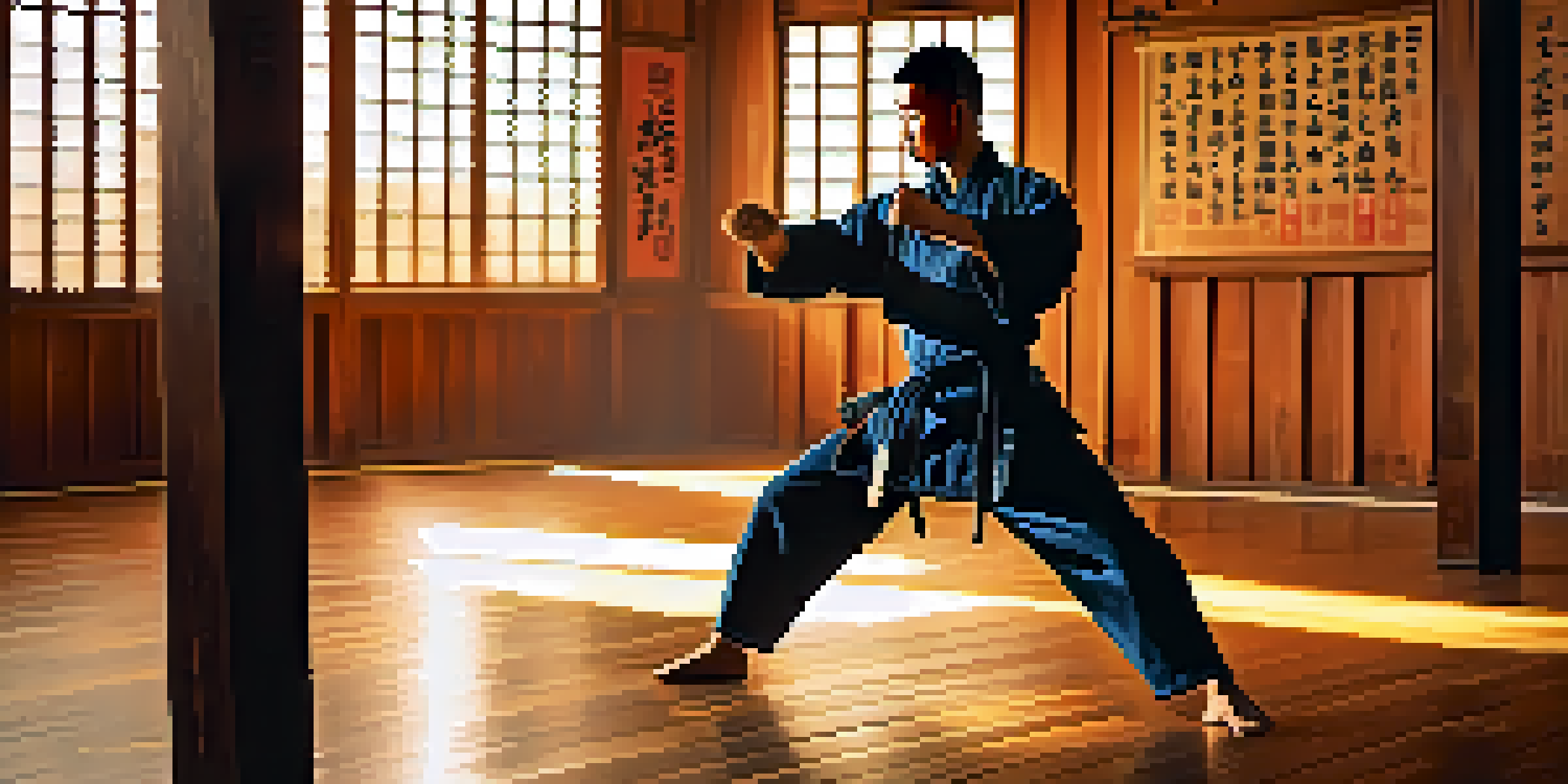Setting Goals in Martial Arts for Personal Achievement

Understanding the Importance of Goal Setting
Setting goals is crucial in martial arts, as it provides direction and purpose. Whether you're a beginner or a seasoned practitioner, having clear objectives helps you stay focused on your journey. Goals act like a compass, guiding you through challenges and keeping your motivation high.
Setting goals is the first step in turning the invisible into the visible.
When you define what you want to achieve, you not only improve your skills but also build confidence. Imagine training without a target; it would feel aimless and frustrating, much like wandering in a maze without an exit. By establishing goals, you create a roadmap that leads you to success and personal growth.
Moreover, goal setting fosters a sense of accomplishment. Each time you achieve a milestone—be it mastering a new technique or earning a belt—you experience a boost in self-esteem. This positive reinforcement encourages you to set new challenges, creating a cycle of continuous improvement.
SMART Goals: A Framework for Success
To make your goals effective, consider using the SMART framework: Specific, Measurable, Achievable, Relevant, and Time-bound. For example, instead of saying, 'I want to get better at karate,' a SMART goal would be, 'I want to improve my roundhouse kick by practicing three times a week for the next month.' This clarity makes your objective tangible.

Each element of SMART goals serves a purpose. Specificity helps you define what success looks like, while measurability allows you to track your progress. Achievable ensures your goals are realistic, relevant connects them to your broader aspirations, and time-bound creates a sense of urgency.
The Power of Goal Setting
Setting clear goals provides direction and motivation, helping martial artists stay focused on their journey.
By adhering to this framework, you can break down larger ambitions into manageable steps. This not only prevents overwhelm but also allows for regular assessments of your progress. As you check off each small goal, you’ll feel a rush of motivation to tackle the next one.
Setting Short-term vs. Long-term Goals
It's important to differentiate between short-term and long-term goals in martial arts. Short-term goals are like stepping stones, guiding you toward your ultimate ambitions. For instance, a short-term goal could be to learn a specific kata within a month, while a long-term goal might be earning a black belt in five years.
A goal without a plan is just a wish.
Balancing both types of goals is key. Short-term goals provide immediate gratification and keep your spirits high, while long-term goals give you a broader perspective on your journey. Think of it like preparing for a marathon: you wouldn't just run the full distance without training; you'd take it one mile at a time.
Moreover, achieving short-term goals fuels your motivation to pursue long-term ones. Each success reinforces the belief that you can reach your ultimate aspirations, making the journey feel less daunting and more achievable. Celebrate those small wins, as they lay the groundwork for your bigger victories.
Creating an Action Plan for Your Goals
Having a goal is just the beginning; you need an action plan to turn that goal into reality. This plan outlines the specific steps you need to take to achieve your objectives. For example, if your goal is to improve your sparring skills, your action plan could include attending extra classes or partnering with a more experienced student.
Consider breaking your action plan into daily, weekly, and monthly tasks. This approach helps you stay organized and accountable. Just like a chef follows a recipe to create a delicious dish, you can follow your action plan to refine your skills and stay on track.
SMART Goals Framework
Using the SMART framework ensures your goals are well-defined, making it easier to track progress and achieve success.
Regularly review and adjust your action plan as needed. Life can throw unexpected challenges your way, and being flexible ensures you stay committed to your goals. By consistently adapting your strategy, you can maintain momentum and continue progressing in your martial arts journey.
Tracking Progress and Celebrating Milestones
Tracking your progress is essential for staying motivated and seeing how far you’ve come. Consider keeping a journal or using a fitness app to log your training sessions, achievements, and reflections. This not only helps you identify areas for improvement but also highlights your growth over time.
Celebrating milestones, no matter how small, is equally important. Each time you reach a goal or complete a significant step, take a moment to acknowledge your hard work. This could be as simple as treating yourself to a favorite meal or sharing your success with friends and family.
Remember, the journey is just as important as the destination. By recognizing your achievements along the way, you reinforce your commitment and passion for martial arts. This positive reinforcement can reignite your enthusiasm during challenging times, reminding you why you started this journey in the first place.
Overcoming Challenges and Staying Motivated
Challenges are an inevitable part of any journey, including martial arts. Whether it's a plateau in your progress or competing against tougher opponents, it's crucial to maintain a positive mindset. Recognize that setbacks are opportunities for growth, not signs of failure.
Staying motivated during tough times can be difficult, but having a support system helps. Connect with fellow martial artists, instructors, or friends who understand your journey. Sharing your experiences and struggles can provide encouragement and remind you that you’re not alone in facing challenges.
Mindset Drives Achievement
A positive mindset fosters resilience and empowers martial artists to view challenges as growth opportunities.
Additionally, revisiting your goals regularly can reignite your passion. Reflect on why you started practicing martial arts and visualize your desired outcomes. This mental exercise can provide clarity and renew your commitment to achieving your objectives, making it easier to push through obstacles.
The Role of Mindset in Goal Achievement
Mindset plays a pivotal role in achieving your martial arts goals. A positive and growth-oriented mindset fosters resilience, allowing you to view challenges as stepping stones rather than roadblocks. Believing in your ability to improve is the first step toward achieving your aspirations.
Conversely, a negative mindset can hinder progress and lead to self-doubt. It's essential to replace limiting beliefs with affirmations that empower you. For instance, instead of thinking, 'I’ll never be as good as others,' remind yourself, 'I am capable of improving with practice and determination.'

Practicing mindfulness and visualization techniques can enhance your mindset. Spend a few moments each day visualizing yourself achieving your goals, whether it’s executing a perfect technique or winning a match. This mental rehearsal not only boosts confidence but also primes your mind for success, making your journey in martial arts even more rewarding.